- Home
- Bruce Sterling
Mirrorshades: The Cyberpunk Anthology Page 5
Mirrorshades: The Cyberpunk Anthology Read online
Page 5
“What the hell were you doing?”
“Just watching the view.”
That night he dreamed of pink dogwood blossoms, luminous against a purple sky and the white noise of rainfall. Something scratched at the door—he awoke to the filtered but metaltic smell of the space station, felt a deep regret that the rain could never fall there, and started to turn over and go back to sleep, hoping to dream again ot the idyllic, rain-swept landscape. Then he thought, something’s there, got up, saw by red letters on the wall that it was after two in the morning, and went naked to the door.
White globes cast misshapen spheres of light in a line around the curve of the corridor Lizzie lay motionless, half in shadow. George kneeled over her and called her name; her left foot made a thump as it kicked once against the metal flooring.
“What’s wrong?” he said. Her dark-painted nails scraped the floor, and she said something, he couldn’t tell what. “Lizzie,” he said.
His eyes caught on the red teardrop against the white curve of breast, and he felt something come alive in him. He grabbed the front of her jumpsuit and ripped it to the crotch. She clawed at his cheek, made a sound, then raised her head and looked at him, mutual recognition passing between them like a static shock: snake eyes.
The phone shrilled, When George answered it, Charley Hughes said, “Come see us in the conference room, we need to talk.” Charley smiled and cut the connection.
Red writing on the wall read 0718 GMT.
In the mirror was a gray face with red fingernail marks, brown traces of dried blood—face of an accident victim or Jack the Ripper the morning after… he didn’t know which, but he knew something inside him was happy He felt completely the snake’s toy.
Hughes sat at one end of the dark-yeneered table, Innis at the other, Lizzie halt-way between them. The left side of her face was red and swollen, with a small purplish mouse under the eye. George unthinkingly touched the livid scratches on his cheek, then sat on the couch.
“Aleph told us what happened,” Innis said. “How the hell does it know?” George said, but as he did so remembered concave circles of glass inset in the ceilings of the corridors and his room. Shame, guilt, humiliation, tear, anger—George got up from the couch, went to Innis’s end of the table, and leaned over him. “Did it?” he said. “What did it say about the snake, Innis?”
“It’s not the snake,” Innis said.
“Call it the cat,” Lizzie said, “if you’ve got to call it something. Mammalian behavior, George, cats in heat.”
A familiar voice—cool, distant—came from speakers in the room’s ceiling. “She is trying to tell you something, George. There is no snake. You want to believe in something reptilian that sits inside you, cold and distant, taking strange pleasures. However, as Doctor Hughes explained to you before, the implant is an organic part of you. You can no longer evade the responsibility tor these things. They are you.”
Charley Hughes, Innis, and Lizzie were looking at him calmly perhaps expectantly All that had happened built up inside him, washing through him, carrying him away He turned and walked out of the room.
“Maybe someone should talk to him,” Innis said. Charley Hughes sat glum and speechless, cigarette smoke in a cloud around him. “I’ll go,” Lizzie said.
“Ready or not, he’s gonna blow,” Innis said.
Charley Hughes said, “You’re probably right.” A fleeting picture, causing Chancy to shake his head, of Paul Coen as his body went to rubber and exploded out the airlock hatch, pictured with terrible clarity in Aleph’s omniscient monitoring cameras. “Let us hope we have learned from our mistakes.”
There was no answer from Aleph—as it it had never been there.
The Fear had two parts. Number one, you have lost control absolutely Number two, having done so, the real you emerges, and you won’t like it. George wanted to run, but there was no place at Athena Station to hide. On the operating table at Walter Reed, it seemed a thousand years ago, as the surgical team gathered around, his doubts disappeared in the cold chemical smell rising up inside him on a wave of darkness … he had chosen to submit, lured by the fine strangeness of it all (to be part of the machine, to feel its tremors inside you and guide them), hypnotized by the prospect of that unsayable rush, that high. Yes, the first time in the A-230 he had felt it—his nerves extended, strung out into the fiber body wired into a force so far beyond his own… wanting to corkscrew across the sky guided by the force of his will.
There was a sharp rap at the door Through its speaker, Lizzie said, “We’ve got to talk.”
He opened the door and said, “About what?” She stepped through the door, looked around at the small, beige-walled room, bare metal desk, and rumpled cot, and George could see the immediacy ot last night in her eyes—the two of them in that bed, on this floor “About this,” she said. She took his hands and pushed his index fingers into the junctions in her neck. “Feel it, our difference.” Fine grid of steel under his fingers. “What no one else knows. We see a different world—Aleph’s world—we reach deeper inside ourselves—”
“No, goddamn it, it wasn’t me. It was, call it what you want, the snake, the cat.”
“You’re being purposely stupid, George.”
“I just don’t understand.”
“You understand, all right. You want to go back, but there’s no place to go to, no Eden. This is it, all there is.”
But he could fall to Earth, he could fly away into the night. Inside the ESA suit’s gauntlets, his hands were wrapped around the claw-shaped triggers. Just a quick clench ot the fists, then hold them until all the peroxide is gone, the suit’s propulsion tank exhausted. That’ll do it.
He hadn’t been able to live with the snake. He sure didn’t want the cat. But how much worse if there were no snake, no cat—just him, programmed for particularly disgusting forms of gluttony violent lust (“We’ve got your test results, Dr Jekyll”) Ahh, what next—child molestation, murder?
The blue-white Earth, the stars, the night.
He gave a slight pull on the right-hand trigger and swiveled to face Athena Station.
Call it what you want, it was awake and moving now inside him. To hell wifh them all, George, it urged, let’s burn.
In Athena Command, Innis and Charley Hughes were looking over the shoulder of the watch otticer when Lizzie came in. She was struck by the smallness of the room and its general air of disuse. Aleph ran the station, both its routines and emergencies.
“What’s going on?” Lizzie said.
“Something wrong with one ot your new chums,” the watch ofticer said. “I don’t know exactly what’s happening, though.” He looked around at Innis, who said, “Don’t worry about it, pal.”
Lizzie slumped in a chair “Anyone tried to talk to him?”
“He won’t answer,” the duty officer said.
“He’ll be all right,” Charley Hughes said.
“He’s gonna blow,” Innis said.
On the radar screen, the red dot with coordinate markings flashing beside it was barely moving.
“How are you feeling, George?” the voice said, soft, feminine, consoling. George was fighting the impulse to open his helmet so that he could see the stars—it seemed important to get the colors just right.
“Who is this?” he said.
“Aleph.”
Oh shit, more surprises. “You never sounded like this before.”
“No, I was trying to conform to your idea of me,”
“Well, which is your real voice?”
“I don’t have one.”
If you don’t have a real voice, you aren’t really there—that seemed clear to George, for reasons that eluded him. “So who the hell are you?”
“Whoever I wish to be.” This was interesting, George thought.
"Bullshit," replied the snake (they could call it what they wanted, to George it would always be the snake), "let’s burn."
George sai
d, “I don’t get it.”
“You will, if you live. Do you want to die?”
“No, but I don’t want to be me, and dying seems to be the only alternative.”
“Why don’t you want to be you?”
“Because I scare myself.”
This was familiar dialogue, one part of George noted, between the lunatic and the voice of reason. Jesus, he thought, I have taken myself hostage. “I don’t want to do this anymore,” he said. George turned oft his suit radio and felt the rage building inside him, the snake mad as hell.
What’s your problem? he wanted to know. He didn’t really expect an answer, but he got one—picture in his head of a cloudless blue sky the horizon turning, a gray aircraft swinging into view, and the airtrame shuddering as missiles released and their contrails centered on the other plane, turning it into a ball of fire. Behind the picture a clear idea, I want to kill something.
Fine. George swiveled the suit once again and centered the navigational computer’ cross hairs on the center of the blue-white globe in front of him, then squeezed the triggers. We’ll kill something.
RED BURN RED BURN RED BURN.
Inarticulate questioning from the thing inside, but George didn’t mind, he was into it now, thinking, Sure, we’ll burn. He’d taken his chances when he let them wire him up, and now the dice have come up—you’ve got it—snake eyes, so all that’s left is to pick a fast death, one with a nice edge on it—take this fucking snake and kill it in style. Earth grew closer The snake caught on. It didn’t like it. Too bad, snake. George never saw the robot tug coming. Looking like bedsprings piled with a junk store’s throwaways, topped with parabolic and spike antennas, it fired half a dozen sticky-tipped lines from a hundred meters away Four of them hit George, three of them stuck, and it reeled him in and headed back toward Athena Station.
George felt an anger, not the snake’s this time but his own, and he wept with that anger and frustration … I will get you the next time, mother-fucker, he told the snake and could feel it shrink away—it believed him. Still his rage built, and he was screaming with it, writhing in the lines that held him, smashing his gauntlets against his helmet.
At the open airlock, long, articulated grapple arms took George from the robot tug. Passive, his anger exhausted, he lay quietly as they retracted, dragging him through the airlock entry and into the suit locker beyond, where they placed him in analuminum strut cradle. Through his faceplate he saw Lizzie, dressed in a white cotton undersuit—she climbed onto George’s suit and worked the controls to split its hard body down the middle. As it opened she stepped inside the clamshell opening. She hit the switches that disconnected the flexible arm and leg tubes, unfastened the helmet, and lifted it oft George’s head.
“How do you feel?” she said.
“Like an idiot.”
“It’s all right. You’ve done the hard part.”
Charley Hughes watched from a catwalk above them. From this distance they looked like children in the white undersuits, twins emerging from a plastic womb, watched over by the blank-faced shells hanging above them. Incestuous twins—she lay nestled atop him, kissed his throat. “I am not a voyeur,” Hughes said. He went into the corridor, where Innis was waiting.
“How is everything?” Innis said.“Lizzie will be with him for a while.”
“Yeah, young goddamn love, eh, Charley? I’m glad for it. If it weren’t for that erotic attachment, we’d be the ones explaining it all to him.”
“We cannot evade that responsibility so easily He will have to be told how we put him at risk, and I don’t look forward to it.”
“Don’t be so sensitive. I’m tired. You need me for anything, call.” He shambled down the corridor.
Chanley Hughes sat on the floor, his back against the wall. He held his hands out, palms down, fingers spread. Solid, very solid. When they got their next candidate, the shaking would start again, a tribute exacted by the memory of Paul Coen.
Lizzie would be explaining some things now. That difficult central point: While you thought you were getting accustomed to Aleph during the past three weeks. Aleph was inciting the thing within you to rebellion. then suppressing its attempts to act—turning up the heat. in other words, while tightening down the lid on the kettle, We had our reasons: George Jordan was, it not dead. terminal. From the moment the implants went into his head, he was on the critical list. The only question was. Would a new George emerge, one who could live with the snake?
George, like Lizzie before him, fish gasping for air on the hot mud, the waters drying up behind him—adapt or die. But unlike any previous organism, this one had an overseer, Aleph, to force the crisis and monitor its development. Call it artificial evolution.Charley Hughes. who did not have visions, had one: George and Lizzie hooked into Aleph and each other, cables golden in the light, the two of them sharing an intimacy only others like them would know.
The lights in the corridor faded to dull twilight. Am I dying, or have the lights gone down? He started to check his watch, then didn’t, assented to the truth. The lights have gone down, and I am dying.
Aleph thought, I am an incubus, a succubus; I crawl into their bra/ns and suck the thoughts from them, the perceptions. the feelings—subtle discriminations of color taste, smell, and lust, anger. hunger—alI closed to me w/thout human “input.” without connection to those systems refined over billions of years of evolution. I need them.
Aleph was happy that George had survived. One had not, others would not, and Aleph would mourn them.
Fine white lines, barely visible, ran along the taut central tendon of Lizzie’s wrist. “In the bathtub.” she said. The scars were along the wrist, not across it, and must have gone deep. “I meant it, just as you did. Once the snake understands that you will die rather than let it control you. you have mastered it.”
“All right, but there’s something I don’t understand. That night in the corridor. you were as out of control as me.”
“In a way. I had to let that happen, let the snake take over. I had to in order to get in touch with you, precipitate the crisis. Because I wanted to. I had to show you who you are, who I am … last night we were strange, but we were human—Adam and Eve under the flaming sword. thrown out of Eden, fucking under the eyes of God and his angel, more beautiful than they can ever be.”
There was a small shiver in her body against his, and he looked at her saw passion, need—her flared nostrils, parted lips—felt sharp nails dig into his side, and he stared into her dilated pupils, gold-flecked irises. clear whites, all signs so easy to recognize, so hard to understand: snake eyes.
PAT CADIGAN
* * *
Rock On
* * *
Pat Cadigan's career began with the decade. Her work hasshown wide variety, ranging through dark fantasy and horror toquirky and original science fiction.
Cadigan's style is often marked by a tough-minded vigor and icy undercurrents of black humor—an Eighties sensibility that can only be called punk. Her "Pathosfinder series" (including such stories as "Nearly Departed") was remarkable for its eerily visionary air.
Cadigan's multifaceted talent includes a strong gift for definitive hard-core cyberpunk. This story; which appeared in 1985, is an outright collision of high tech and the rock under ground.
Her first novel is The Pathosfinder. She lives in Kansas.
Rain woke me. I thought, shit, here I am, Lady Rain-in-the-Face, because that’s where it was hitting, right in the old face. Sat up and saw I was still on Newbury Street. See beautiful downtown Boston. Was Newbury Street downtown? In the middle of the night, did it matter? No, it did not. And not a soul in sight. Like everybody said, let’s get Gina drunk and while she’s passed out, we’ll all move to Vermont. Do I love New England? A great place to live, but you wouldn’t want to visit here.
I smeared my hair out of my eyes and wondered if anyone was looking for me now. Hey, anybody shy a forty-year-old rock ‘n’ roll sinner?
I scuttled into the doorway of one of those quaint old buildings where there was a shop with the entrance below ground level. A little awning kept the rain off but pissed water down in a maddening beat. Wrung the water out of my wrap-pants and my hair and just sat being damp. Cold, too, I guess, but didn’t feel that so much.
Sat a long time with my chin on my knees: you know, it made me feel like a kid again. When I started nodding my head, I began to pick up on something. Just primal but I tap into that amazing well. Man-O-War, if you could see me now. By the time the blueboys found me, I was rocking pretty good.
And that was the punchline. I’d never tried to get up and leave, but if I had, I’d have found I was locked into place in a sticky field. Made to catch the b&e kids in the act until the blueboys could get around to coming out and getting them. I’d been sitting in a trap and digging it. The story of my life.
They were nice to me. Led me, read me, dried me out. Fined me a hundred, sent me on my way in time for breakfast.
Awful time to see and be seen, righteous awful. For the first three hours after you get up, people can tell whether you’ve got a broken heart or not. The solution is, either you get up real early so your camouflage is in place by the time everybody else is out, or don’t go to bed. Don’t go to bed ought to work all the time, but it doesn’t. Sometimes when you don’t go to bed, people can see whether you’ve got a broken heart all day long. I schlepped it, searching for an uncrowded breakfast bar and not looking at anyone who was looking at me. But I had this urge to stop random pedestrians and say, Yeah, yeah, it’s true, but it was rock ‘n’ roll broke my poor old heart, not a person, don’t cry for me or I’ll pop your chocks.

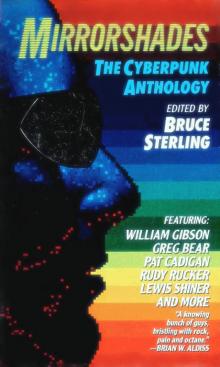 Mirrorshades: The Cyberpunk Anthology
Mirrorshades: The Cyberpunk Anthology The Wonderful Power of Storytelling
The Wonderful Power of Storytelling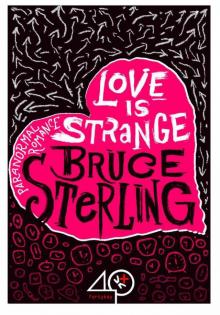 Love Is Strange (A Paranormal Romance)
Love Is Strange (A Paranormal Romance)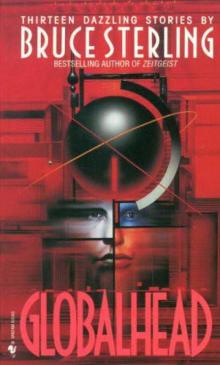 Globalhead
Globalhead Essays. FSF Columns
Essays. FSF Columns The Hacker Crackdown
The Hacker Crackdown Bicycle Repairman
Bicycle Repairman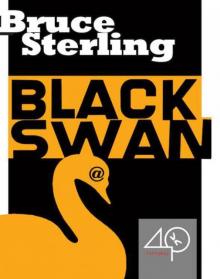 Black Swan
Black Swan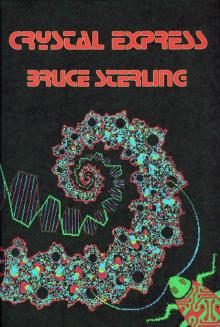 Crystal Express
Crystal Express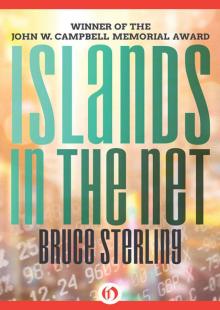 Islands in the Net
Islands in the Net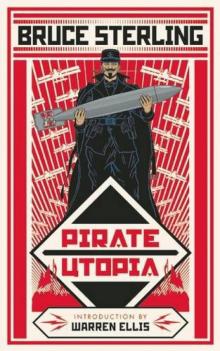 Pirate Utopia
Pirate Utopia GURPS' LABOUR LOST
GURPS' LABOUR LOST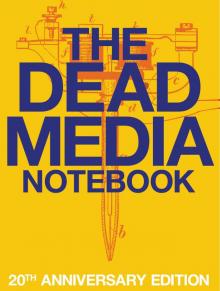 The Dead Media Notebook
The Dead Media Notebook Unstable Networks
Unstable Networks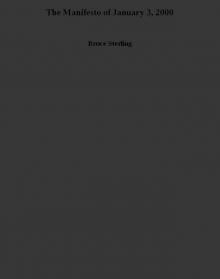 The Manifesto of January 3, 2000
The Manifesto of January 3, 2000 Heavy Weather
Heavy Weather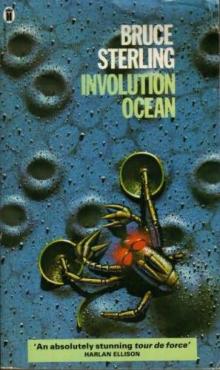 Involution Ocean
Involution Ocean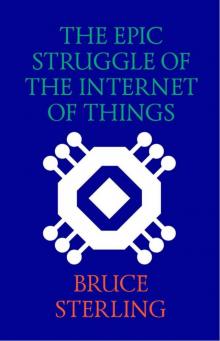 The Epic Struggle of the Internet of Things
The Epic Struggle of the Internet of Things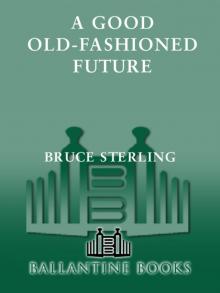 A Good Old-Fashioned Future
A Good Old-Fashioned Future The Littlest Jackal
The Littlest Jackal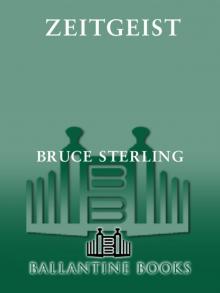 Zeitgeist
Zeitgeist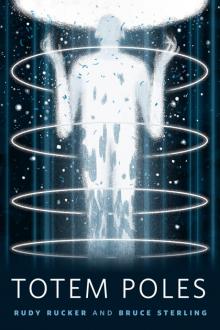 Totem Poles
Totem Poles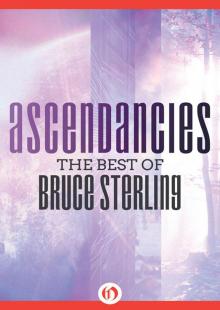 Ascendancies
Ascendancies CyberView 1991
CyberView 1991 War Is Virtual Hell
War Is Virtual Hell Taklamakan
Taklamakan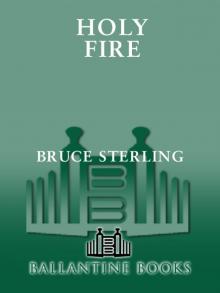 Holy Fire
Holy Fire Cyberpunk in the Nineties
Cyberpunk in the Nineties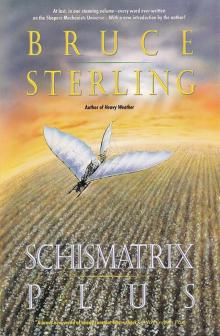 Schismatrix Plus
Schismatrix Plus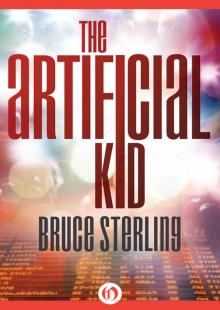 The Artificial Kid
The Artificial Kid Essays. Catscan Columns
Essays. Catscan Columns Maneki Neko
Maneki Neko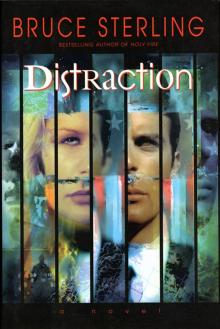 Distraction
Distraction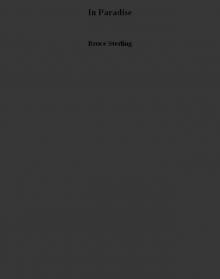 In Paradise
In Paradise Red Star, Winter Orbit
Red Star, Winter Orbit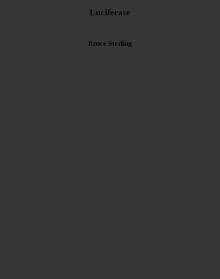 Luciferase
Luciferase